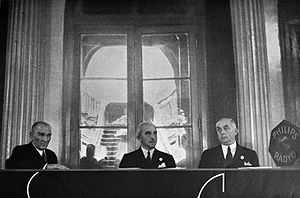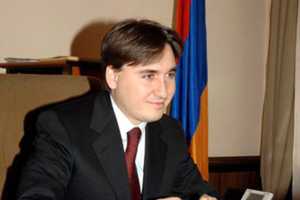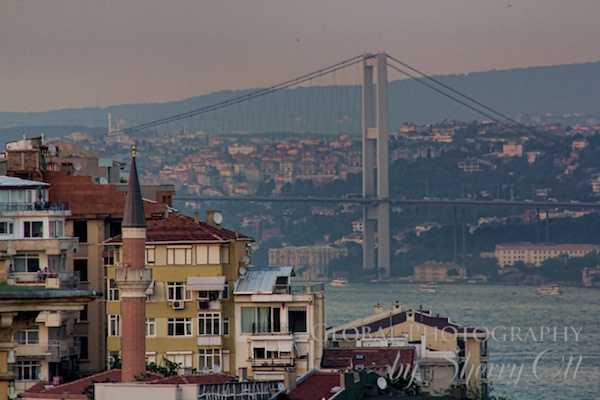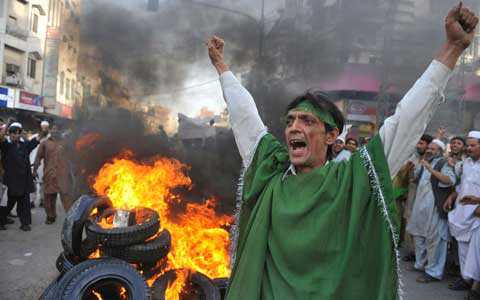Eric Ellis
Turkey, with its strong economy and links to Asia, may not need to be part of the European Union.
IS IT European? Asian? Both? Neither? It’s a millenniums-old question; culturally, religiously, geographically and economically. And one that could be posed more and more of Australia and its embrace, if that’s what it is, of booming Asia.
The answer is elusive and multilayered. But spend a day marvelling at the retail phenomenon that is Kanyon in Istanbul’s gleaming new Levent financial district – to merely describe the massive Kanyon as a mall would be a major commercial undersell – and you’d have to think that question again. Judging from its glamorous tenants, Kanyon’s sensibility is high-end Euro-chic certainly, but the vibe is also LA at its modish funkiest. There are no Kaths or Kims at Kanyon.
Amid the ocean-going retail therapy being performed here, the one vibe Kanyon doesn’t much express is Islam, though most of the shoppers flashing wads of euros are indeed Muslims, even the 20-somethings in kitten heels and fleshy spaghetti-strapped summer slips dragging delighted, covered grandmas into L’Occitane, Oliver Peoples and Agent Provocateur. Immersed in Kanyon’s designer heaven, its easy to forget that Turkey is 98 per cent Islamic, with all the cliched preconceptions that suggests. Moreover, Turkey is governed by a party that doesn’t baulk at being described as Islamist, but on whose eight-year watch places like Kanyon have arrived and thrived.
Since the rule of Gallipoli hero Mustafa Kemal Ataturk through the 1920-30s, modern Turkey has aspired to formally and politically be regarded as European. It first applied to the EU’s predecessor bodies in 1959, just two years after the Treaty of Rome that unified modern Europe. But it’s been a struggle endured in vain. Today, Turkey’s still waiting, miffed as lesser former communist states have jumped the queue into the EU.
Economically, it seems a no-brainer. The IMF measures G-20 member Turkey as the world’s 17th biggest economy, its $US1 trillion output larger than all but five of the European Union’s 27 member states. Measured by GDP per capita, Turkey is bigger than five-year EU members Bulgaria and Romania and alongside its three former Soviet Baltic states.
Greater Istanbul provides about half of Turkey’s GDP and were it a separate state, its economy would be bigger than that of nine EU members, its GDP per capita up there with Germany and France. And there is serious money here too. In 2008, Forbes ranked Istanbul as fourth on its billionaires-by-city list, behind Moscow, London and New York.
Turkey stumbled last year in the wake of the 2008 financial crisis but few European economies rebounded with its vigour, following the 11.7 per cent GDP expansion in this year’s March quarter, with 10.3 per cent growth in the June second quarter. As Turks impatient to enter Euroland remind, its not Turkey that’s giving the EU the wobbles to threaten Europe’s economic raison d’etre but Portugal, Ireland, Greece and Spain, the so-called PIGS economies.
Indeed, there is a strong argument that far from Turkey waiting patiently to be officially deemed European, its entry would greater advantage the EU than it would Turkey, that Turkey would become Europe’s easterly emerging market, to recapture its mojo, rather as the American ”New Economy” that took off in the late 1990s helped shield the US from meltdowns in Asia, Russia and Mexico and street ahead of Japan. This is the view of industrialists like Suzan Sabanci Dincer, the stylish 45-year-old heiress of her family’s banking-to-cars-and-chemicals conglomerate. “The EU should have Turkey as a new member because it will add excitement and growth,” she says.
That the EU, ostensibly an Atlantic idea, adds new members to its east makes that argument all the more compelling. Turkey is arguably the only ”European” entity that makes any meaningful claim to being Asian, where the global economic axis is fast tilting. Turkish is even spoken in China. It’s an ancient country that, like many thrusting parts of Asia, feels new and invigorating.
Because Turkey has long been dancing to a European tune in its efforts to enter the EU, it virtually functions as a de facto EU state. Just as Asia is for Australia, about 75 per cent of Turkey’s trade is with Europe. Its financial sector adheres to European standards, unsurprising given that about half its banking assets are controlled out of European financial capitals. Multilingual and democratic, its laws, infrastructure, regulations and its democracy tilt more and more European.
So, if you’re Brussels, what’s not to like? The truth that dare not speak its name seems to be religion. Though ostensibly an economic entity, the EU is a very Christian club. Were it to enter, Turkey would be its only Muslim member, its 74 million people second only to Germany’s 82 million by population. That spooks a lot of Europeans, particularly in places like the Netherlands, Austria, Sweden and Denmark whose voters are lashing back at liberal immigration and welfare policies. Through an Asia-Pacific prism, this seems narrow and short-sighted. Immigrants tend to follow prosperity and if Turkey booms and develops while western Europe is mired in post-GFC ennui, it would seem more logical that the longer-term movement might be eastward, not westward.
That could also be true of the Turks themselves. The popular and impatient Prime Minister Recep Tayyip Erdogan is gently hardening his line on EU entry.
This week, his President and former PM, Abdullah Gul, suggested in a BBC interview that since Turkey is becoming European administratively by stealth anyway, it’s finding more in common linking into the roaring economies of the Middle East and Asia than obsessing too much about joining the EU.
As Asia booms, Turkey’s millenniums-old question might well be answered yet, at Europe’s loss.
http://www.smh.com.au/business/turks-might-not-wait-20101110-17nto.html, November 11, 2010
 The thought is raised in a recent posting by Elmira Bayrasli of New York, who promotes microcapitalism. I got to thinking about this when she asked Pervez Musharraf, at his appearance at the Council on Foreign Relations this week, about his deep study of Mustafa Kemal Ataturk, founder of modern Turkey. What had that taught him about the role of Pakistan’s military–which Musharraf headed before he opted also to head the state? In Turkey as well, the military has had a mixed history but these days remains the guardians of Ataturk’s secular state even as a maturing democracy favors a more Muslim cast.
The thought is raised in a recent posting by Elmira Bayrasli of New York, who promotes microcapitalism. I got to thinking about this when she asked Pervez Musharraf, at his appearance at the Council on Foreign Relations this week, about his deep study of Mustafa Kemal Ataturk, founder of modern Turkey. What had that taught him about the role of Pakistan’s military–which Musharraf headed before he opted also to head the state? In Turkey as well, the military has had a mixed history but these days remains the guardians of Ataturk’s secular state even as a maturing democracy favors a more Muslim cast.




